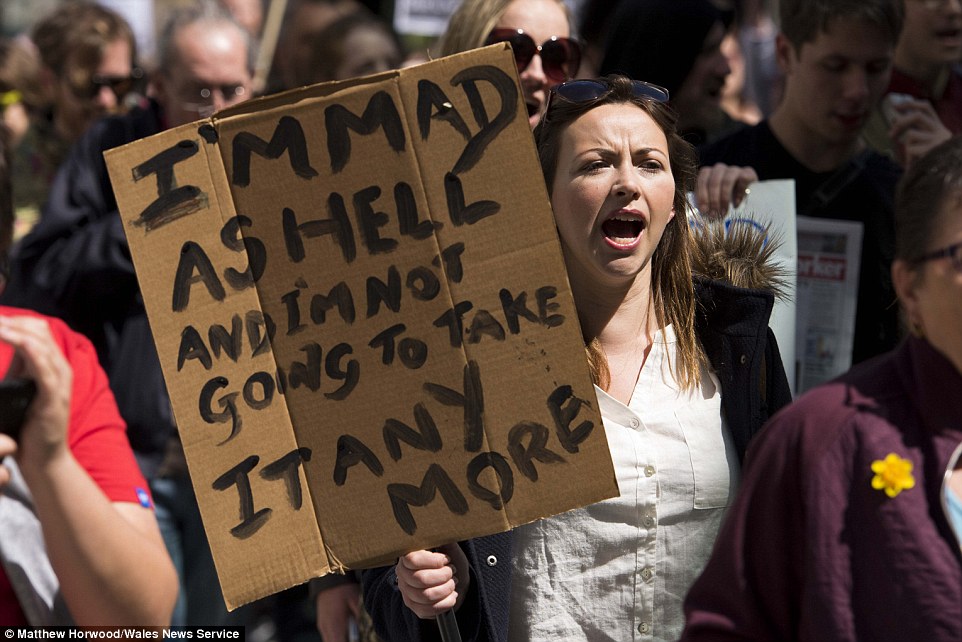
Angry protests: not an American phenomenon.
If you did not want Donald Trump to be president, you now have some homework for the next four years: get engaged civically.
I wrote before the election that anger was an unusually prominent feature of the campaign. And there’s certainly a lot of it now. That anger includes some understandable frustration, but also unfortunately includes anti-Trump protests that are a couple weeks late; anti-democratic calls to prevent Trump from doing anything; and indignant, internecine left-on-left rants. None of those is productive (and the second is actually offensive to the idea that this was a legitimate democratic process). Let’s hope that most of the angry folks are able to pick themselves up and channel their energy into something productive. Marches in solidarity with [name your at-risk group here] are a fine start, a way to remind the rest of America that the hatred of Trump’s campaign is not the way forward.
As the fog cleared on November 9th, my first cogent thoughts were two questions: first, what kind of bubble do I live in that made this seem so unlikely? And second, how would I be processing this if I were not a straight white man?
As for the first, the answer is straightforward—the bubble of New York Times-reading East Coast city-dwellers—but hopefully there’s more to it. It’s possible to widen one’s bubble, either consciously or subconsciously, and that it’s typically an incremental process. Incremental unless something jarring happens, and I think this election qualifies.
In my last column, I suggested that it was not a surprise that Trump voters were out there. What was upsetting was that enough white Americans, men and women alike, were able to look past the disgusting rhetoric to elect him. Yes, this election was not only about race—it wasn’t just white men who didn’t go to college who voted for him, after all. It’s time to try to consciously widen our bubbles.
As for the second question, there’s obviously no way for me to know. But it’s not a good time to be anything but a straight white man (not that everyone had it great 8 days ago).
Personally, I am going to be “fine.” I’m not at risk of deportation; my access to medical care, especially reproductive care, isn’t going anywhere; my salary will be commensurate with my ability, skill, and peers; I’ll be able to vote in the next election. What I can do is try to empower people whose rights are at risk. And I must try, because my life will be worse when those individuals’ lives are worse.
Are you anxious about the voting rights of people of color? Are you anxious for the 20 million people who would lose their health insurance if Obamacare gets repealed? Or the millions more who rely on clinics for women’s reproductive health care because their home states already don’t support them? Or maybe about blanket bans on Muslim immigration? Or that border wall?
I am sure that in 20 years, we will be hearing about a budding candidate for higher office whose passion for public service was ignited by this year’s unmasking of America’s darker side. (The headlines will read, “The Darling of the Post-Trump Political Class,” or maybe in the New York Post, “Trump’s Chick Home to Roost.”) I’m sure that we will know someone who makes a significant life change—dedicating one’s free time or even changing careers—to work for progress. But our engagement with social progress doesn’t have to be that revolutionary to be worthwhile.
The choice to engage is daunting. Not only because it’s hard to get the federal government to do something. It’s also easy to get caught up worrying if it’s appropriate to add your voice to the conversation. Where do we begin? How could I possibly add something productive to the effort to safeguard the voting rights of people I’ve never met in a place 1,000 miles away I’ve never even been to? But too many of us have reached that precipice and turned back. It’s time for more civility, for committing oneself to others in a real-life (not Facebook) way.
Neil Reilly is a TBQ Blog Editor.
